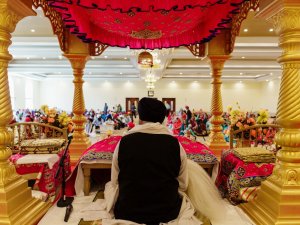Feb 13th. The wide roads of the Singhu and Tikri Borders today are chock-a-block with anxious yet determined farmers. Most of their families have spent the last two months under the cold skies of Delhi, unsure of when they will go home, back to their routine lives. A single resolution unites them, “You can either stand back and watch, or become part of a revolution!”
It is here I met Jaswant Kaur, a 54-year-old woman from Moga, Punjab. Talking to her made me feel like I was talking to a lioness, not a middle-aged woman. Jaswant Kaur and her family have been at the borders for the last 25 days. She, and many other women and their families, journeyed from their pind (village) to Delhi via tractor. Currently, she resides in a trolley attached to that tractor. So many people have made temporary homes on the streets so, it is not surprising when you hear this song playing loudly near the main stage at Singhu Border, “Saade layi kile ban gayian, sadkan ne paatshah! Dilli vich Punjab wasda. (For us the roads have become forts. Now Punjab lives and flourishes in Delhi.)”
Our tête-à-tête started over an orange that she offered me as I went about talking to the other women from her village. In a firm voice she said, “Our Gurus have made innumerable sacrifices for truth and faith, a precedent you cannot find anywhere in the world. Trivial things like weather disturbances, rain, or scorching heat cannot affect our determination. The fight is beyond our lands as there is a lot more at stake. Punjab cannot suffer another gloom. The only option is victory!”
Daughters Of The Soil
Where on-one-hand the parliament has muted its voice, the streets of the Singhu and Tikri Borders are throbbing with the roars of Singhnis (lionesses). Destroying the age-old notion that women must be confined to their homes, the females of Punjab are wearing the armor of patience in this fight to save their lands. “The first step is to repeal the farm laws, and we will succeed in that definitely,” exclaimed Jaswant Kaur, showcasing pride and resilience.
“Farming is our livelihood,” said another woman from the group. “If we will lose our lands, how will our family survive? Farmers are helpless. That is why we are on the roads. If the government repeals the black laws, everyone would happily return to their homes. We are here to preserve our life and our lands, and we will continue to fight for our fundamental rights.”
Studied only until the eighth standard, Jaswant Kaur added, “I may not be very educated, but I will not give up on our fight until we get justice.”
Jaswant Kaur is quite knowledgeable about farming. Back at home, every morning after completing the house chores, she goes to the farm to assist her husband and her son. They have five acres of land, on which they mainly grow wheat, sarson (mustard), and some green vegetables. She has a daughter and daughter-in-law too in the family who in their spare time recite Shabad Gurbani. “My daughters’ inclination towards Shabad Kirtan makes the atmosphere of the house very religious,” she reminisced. Jaswant Kaur keenly wishes that her daughter completes her graduation with good grades. She believes that for the better future of any state, its girls should get a higher education, as reflected in Gurbani:
ਸੋ ਕਿਉ ਮੰਦਾ ਆਖੀਐ ਜਿਤੁ ਜੰਮਹਿ ਰਾਜਾਨ ॥
so kiau ma(n)dhaa aakheeaai jit ja(n)meh raajaan ||
So why call her bad? From her, royalty is born.
The Sun Never Sets on The Farmers’ Protest
At the border, Jaswant Kaur and other women spend their time preparing Guru ka Langar.
“All the farmers there are Guru ki Sangat, and performing seva is our duty as well as dharam,” mentioned Bhupinder Kaur, another protestor.
Apart from performing seva, their group attends on-going stage programs. They listen to the speeches of their leaders and often chant venturesome slogans to uplift their spirits. With slogans like “Kisaan Mazdoor Ekta-Zindabad (Long Live Farmers and Laborers Unity)” and “Jai Jawan, Jai Kisaan (Hail to the soldiers, hail to the famers)” echoing in the background, Jaswant Kaur sits between sacks of vegetables, chopping onions. I asked her if cutting onions made her eyes teary, she replied that continuous hard work and naam japna does not let her eyes tear; the women around her were continuously chanting “Waheguru” while performing their work.
Jaswant Kaur’s husband is engaged in a different type of seva while at the border. He is usually around the main stage with his friends busy organising and managing the activities there. He also often visits different villages to attend panchayat (council) meetings.
It’s almost 5 o’clock in the evening now, and we started to stroll around the area and spotted a group of young boys washing their clothes on the road-side. Jaswant Kaur smiled and said enthusiastically, “They probably never washed a single handkerchief at home and here they do all the duties, so enthusiastically. These boys also chop vegetables and struggle with rolling pins to make round chapatis for langar.” With folded hands, she looked up and prayed to Akaal Purakh for these people to be rewarded for their good deeds.
The Power of Women
Talking about police crackdowns of the protest, I looked at Jaswant Kaur, trying to find any shred of fear in her eyes. She was not afraid of anybody or any situation. Speaking of the unlawful arrest of Nodeep Kaur, she said, “Nodeep is a lioness. And whenever she is freed she will roar again with much more intensity because ghayal sherni or vi jyada khatarnak hundi hai (a wounded lioness is even more dangerous).”
Later, waving at a local resident, Jaswant Kaur said, “The residents, especially the Haryanvi (those from the state of Haryana) females at Singhu Border help a lot”. She pointed towards the shop on the side of the road and told me about Nirmala. It is at Nirmala’s home that Jaswant Kaur goes whenever she needs to freshen up. Nirmala and her daughters have a cordial relationship with the protestors and even cook different dishes at their home to share with them. Jaswant Kaur often exchanges the wisdom of Sikh history with Nirmala. They even watched the movie “Chotte Sahibzade” together on YouTube.
Zid Te Zazba (Stubbornness versus Dedication)
It is evident from the speeches of Kisan Neta (farmer’s union leaders) that this protest will not end anytime soon. This protest needs patience, enthusiasm, and lots of time. So, for how many days is she planning to reside there? – I asked Jaswant Kaur.
She said, this is a fight of zid te zazba (stubbornness versus dedication). Soon, farmers’ enthusiasm and devotion will prevail over the stubbornness of the government. All the farmers are united irrespective of caste, creed, or religion and are fighting determinately to preserve their faslan te naslan (crops and peoplehood) for the betterment of their farms and future generations. All of them together recite Ardas and pray for “sarbat da bhala (welfare of all)“. They have full hope that the Almighty will soon accept their prayers; “rab de ghar der hai andher nahi (There might be a delay in the Divine Court, but there is no darkness or injustice in this Court.)”
Hear the Roar
Whenever a female protagonist in a story becomes a rebel, it’s evident that there will be a revolution in society. The female community is in full force this time lending its voice to one of the biggest agrarian movements that has roiled India since the country gained independence in 1947. They are smashing patriarchy every day, assuming leadership roles at the morcha (protest), and have a spirit full of determination and courage, which makes this protest different from others.
From shawl-swathed 80-year-olds braving the extreme winter chill, to middle-aged housewives in salwar kameez, from young teens in jeans and tshirts to farm widows whose husbands died by suicide due to crippling farm loans, they are all out on the front lines.
There has been no dearth of stories from Punjab and Haryana about rural and urban women, old and young, as well as lettered and unlettered, assuming leadership roles during the ongoing season of dissent against the contentious farm laws. For example, during the festival of Lohri (13th January) in Punjab, thousands of women burnt copies of the three contentious laws. On Republic Day (26th January), more than 200 women occupied the driving seat of tractors illustrating how enthusiastically women are assumed leadership roles in every sphere of life.
Females are not only protesting actively and enthusiastically, but the ones left at home are also working day and night performing household chores and farm-related activities including sowing, winnowing, harvesting, and other labor-intensive processes and non-mechanized farm tasks. The heavy lifting on farms, often done by the men, has also fallen upon their shoulders since November 2020, when their male counterparts left for the morcha at Delhi’s borders.
While a lot of difficulties, tensions, worries, panic, and rumors arise there are still women like Jaswant Kaur who are fighting for their rights with determination – for the long haul. Daughters of the soil are fighting like warriors. They are fierce like Mai Bhago and tender like Bhai Kanhaiya. They are the inspirations for others. Their courage must be saluted. History will remember them for their contribution to the fight which is for the cause of the whole nation and every individual.
As a firsthand witness, I can see – the sun never sets on the farmers protest as the farmers’ souls carry exceptional light. Darkness is nothing in front of this light and it will keep lighting up the world and humanity. The Chardikala spirits of the farmers illuminate the ambiance of the borders all day.
Japleen Kaur is a 22 year student with a graduate degree in psychology from the University of Delhi.
She is currently pursuing higher education.
Japleen is an amateur photographer and freelance writer.










